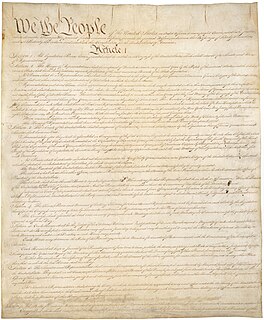
The Fifteenth Amendment to the United States Constitution prohibits the federal government and each state from denying a citizen the right to vote based on that citizen's "race, color, or previous condition of servitude". It was ratified on February 3, 1870, as the third and last of the Reconstruction Amendments.
Buckley v. Valeo, 424 U.S. 1 (1976), is a U.S. constitutional law Supreme Court case on campaign finance. A majority of judges held that limits on election spending in the Federal Election Campaign Act of 1971 §608 are unconstitutional. In a per curiam opinion, they ruled that expenditure limits contravene the First Amendment provision on freedom of speech because a restriction on spending for political communication necessarily reduces the quantity of expression. It limited disclosure provisions and limited the Federal Election Commission's power. Justice Byron White dissented in part and wrote that Congress had legitimately recognized unlimited election spending "as a mortal danger against which effective preventive and curative steps must be taken".

The New Hampshire Supreme Court is the supreme court of the U. S. state of New Hampshire and sole appellate court of the state. The Supreme Court is seated in the state capital, Concord. The Court is composed of a Chief Justice and four Associate Justices appointed by the Governor and Executive Council to serve during "good behavior" until retirement or the age of seventy. The senior member of the Court is able to specially assign lower-court judges, as well as retired justices, to fill vacancies on the Court.

The Supreme Court of Pennsylvania is the highest court in the Commonwealth of Pennsylvania's Unified Judicial System. It also claims to be the oldest appellate court in the United States, a claim that is disputed by the Massachusetts Supreme Judicial Court. The Supreme Court of Pennsylvania began in 1684 as the Provincial Court, and casual references to it as the "Supreme Court" of Pennsylvania were made official in 1722 upon its reorganization as an entity separate from the control of the royal governor. Today, the Supreme Court of Pennsylvania maintains a discretionary docket, meaning that the Court may choose which cases it accepts, with the exception of mandatory death penalty appeals, and certain appeals from the original jurisdiction of the Commonwealth Court. This discretion allows the Court to wield powerful influence on the formation and interpretation of Pennsylvania law.

Joseph Philo Bradley was an American jurist best known for his service on the United States Supreme Court, and on the Electoral Commission that decided the disputed 1876 presidential election.

The Equal Protection Clause is a clause within the text of the Fourteenth Amendment to the United States Constitution. The clause, which took effect in 1868, provides "nor shall any State [...] deny to any person within its jurisdiction the equal protection of the laws".
First National Bank of Boston v. Bellotti, 435 U.S. 765 (1978), is a U.S. constitutional law case which defined the free speech right of corporations for the first time. The United States Supreme Court held that corporations have a First Amendment right to make contributions to ballot initiative campaigns. The ruling came in response to a Massachusetts law that prohibited corporate donations in ballot initiatives unless the corporation's interests were directly involved.
Bouie v. City of Columbia, 378 U.S. 347 (1964), was a case in which the Supreme Court of the United States held that due process prohibits retroactive application of any judicial construction of a criminal statute that is unexpected and indefensible by reference to the law which has been expressed prior to the conduct in issue. This holding is based on the Fourteenth Amendment prohibition by the Due Process Clause against ex post facto laws.
Powell v. McCormack, 395 U.S. 486 (1969), is a United States Supreme Court case that held that the Qualifications of Members Clause of Article I of the US Constitution is an exclusive list of qualifications of members of the House of Representatives, which may exclude a duly-elected member for only those reasons enumerated in that clause.
Davis v. Federal Election Commission, 554 U.S. 724 (2008), is a decision by the United States Supreme Court, which held that Sections 319(a) and (b) of the Bipartisan Campaign Reform Act of 2002 unconstitutionally infringed on a candidate's First Amendment rights.
James Bopp Jr.. is an American conservative attorney. He has repeatedly been named one of the 100 most influential lawyers in the United States by the National Law Journal, and is most known for his work associated with election laws and campaign finance.

Anthony McLeod Kennedy is an American lawyer and jurist who served as the 93rd Associate Justice of the Supreme Court of the United States from 1988 until his retirement in 2018. He was nominated to the court in 1987 by President Ronald Reagan, and sworn in on February 18, 1988. After the retirement of Sandra Day O'Connor in 2006, he was the swing vote on many of the Roberts Court's 5–4 decisions.
Caperton v. A. T. Massey Coal Co., 556 U.S. 868 (2009), is a case in which the United States Supreme Court held that the Due Process clause of the Fourteenth Amendment requires a judge to recuse himself not only when actual bias has been demonstrated or when the judge has an economic interest in the outcome of the case, but also when "extreme facts" create a "probability of bias."

Clarence Thomas is an American judge, lawyer, and government official who currently serves as an Associate Justice of the Supreme Court of the United States. He is currently the most senior associate justice on the Court following the retirement of Anthony Kennedy. Thomas succeeded Thurgood Marshall and is the second African American to serve on the Court. Among the current members of the Court he is the longest-serving justice, with a tenure of 10,054 days as of May 3, 2019.
Communist Party of Indiana v. Whitcomb, 414 U.S. 441 (1974), was a United States Supreme Court case based on the First Amendment to the U.S. Constitution that invalidated Indiana's loyalty oath requirement.
Rutan v. Republican Party of Illinois, 497 U.S. 62 (1990), was a United States Supreme Court decision that held that the First Amendment forbids a government entity from basing its decision to promote, transfer, recall, or hire low-level public employees based upon their party affiliation.
McCutcheon v. Federal Election Commission, 572 U.S. 185 (2014), is a landmark campaign finance decision of the United States Supreme Court. The decision held that Section 441 of the Federal Election Campaign Act (FECA), which imposed a limit on contributions an individual can make over a two-year period to national party and federal candidate committees, is unconstitutional.

The White Court refers to the Supreme Court of the United States from 1910 to 1921, when Edward Douglass White served as Chief Justice of the United States. White, an associate justice since 1894, succeeded Melville Fuller as Chief Justice after the latter's death, and White served as Chief Justice until his death a decade later. He was the first sitting associate justice to be elevated to chief justice in the Court's history. He was succeeded by former president William Howard Taft.
Colorado Republican Federal Campaign Committee v. FEC, 518 U.S. 604 (1996), was a case heard by the Supreme Court of the United States in which the Colorado Republican Party challenged the Federal Election Commission (FEC) as to whether the "Party Expenditure Provision" of the Federal Election Campaign Act of 1971 (FECA) violated the First Amendment right to free speech. This provision put a limit on the amount of money a national party could spend on a congressional candidate's campaign. The FEC argued that the Committee violated this provision when purchasing a radio advertisement that attacked the likely candidate of the Colorado Democratic Party. The court held that since the expenditures by the Committee were made independently from a specific candidate, they did not violate the campaign contribution limitations established by the FECA, and were protected under the First Amendment.
Burson v. Freeman, 504 U.S. 191 (1992), was a United States Supreme Court case in which the Court held that a Tennessee law that restricted from political campaigning within 100 feet of a polling place did not violate the First Amendment.
















